Women Development Cell
Department Details
The Women Development Cell was established in the college in the year 2012. The aim is to build a gender sensitive campus. The college has set up the WDC to address concerns of gender discrimination and recommend measures and policies for gender parity at the college. After the Sexual Harassment Act of 2013 and the UGC Guidelines of 2015, the college has set up the Internal Complaints Committee to address complaints of Sexual Harassment.
The aim and objective of the WDC is to prevent sexual harassment at workplace and to promote general wellbeing of female students teaching and non-teaching women staff on the college. The cell is also responsible to undertake the awareness programmes on gender sensitization, women rights and women empowerment in colleges.
Women Development Cell,is accountable for awareness of gender sensitization, women’s rights and promoting general wellbeing of students, teaching staff, support staff of college.
WDC is to create an inclusive environment for all genders, equitable opportunities to empower women to attain their full potential which have mutual benefits to the genders and society.
Objectives of WDC
- To undertake the awareness programmes on gender sensitization, women’s rights and women empowerment in college.
- To build a gender sensitive and inclusive campus
- To address concerns of gender discrimination
- To prevent sexual harassment at workplace (college campus)
Women development cell 2021-22 to 2024-25
- Dr. Bharat Karhad : President
- Dr Jaishri Gavhane : Coordinator
- Smt. Sunita Belose : Member(Organization Representative )
- Prof. Skandha khedekar : Member (Prof. Representative)
- Dr.Sureshh Nimbalkar : Member (Prof. Representative)
- Dr. Balasaheb Gunjal : Member (Representative of DLLE)
- Prof. Kamble Maldev : (National Service Scheme Representative)
- Smt. Vithabai kadam : Member (Social Worker)
- Adv. Vaishali Nitin Bhosale : Member (Legal Expert)
- Mr Sanjay Bamane : Member (Office Senior Clerk)
- Ku. waghe Vibhuti : Member (Student Representative NSS)
- Ku. Vinayti Indulkar : Member (Student Representative DLLE)
| Sr. No. | Name | Document |
|---|---|---|
| 1. | WDC Meeting Minutes | View/Download |
| 2. | WDC Report from 2016 to 2021 | View/Download |
Internal Complaint Committee (ICC)
N. K. Varadkar Arts and R. V. Belose Commerce College Dapoli is a coeducational institution providing equal opportunities to all. Men and women work together in a congenial atmosphere, however if there are any complaints involving physical contacts or advances, demand for sexual favours, sexually tainted remarks, and any unwelcome physical, verbal or nonverbal expressions of a sexual nature; it is addressed and appropriate action is taken. This cell aims at sensitizing the students and staff to work diligently to prevent sexual harassment in the college. Complaints of sexual harassment shall be lodged with the Committee and appropriate disciplinary action is initiated by the members in accordance to the rules and regulations of the college.
Vision:
We envision a safe environment and protection against sexual harassment of women at N. K. Varadkar Arts and R. V. Belose Commerce College Dapoli and for Redressal of complaints of sexual harassment and to ensure gender equality in Varadkar Belose College Dapoli.
Mission:
- To provide safe workplace.
- To develop a policy against sexual harassment for women at Varadkar Belose College Dapoli.
- To ensure the implementation of the policy in letter and spirit through proper reporting of the complaints and their follow-up procedures.
- To uphold the commitment of the Institute to provide an environment free of gender based discrimination.
- To promote a social and psychological environment to raise awareness on sexual harassment in its various forms.
- To create a secure physical and social environment to deter any act of sexual harassment.
To evolve a permanent mechanism for the prevention and Redressal of sexual harassment cases and other acts of gender based violence at Varadkar Belose College Dapoli.
Why ICC?
- It is formed according to the provisions of the POSH ACT-Sexual Harassment of Women at Workplace Act of 2013, 9th December 2013. (Prevention, Prohibition and Redressal).
- It is also mentioned in University Grants Commission (Prevention, Prohibition and Redressal of sexual harassment of women employees and students in higher educational institutions) Regulations, 2015-2nd May 2016.
What is ICC?
- The POSH Act demanded an ICC be made at all workplaces for the Redressal of sexual harassment cases.
Functions of ICC:
- To prevent sexual harassment at workplace.
- To prevent discrimination and sexual harassment against girls by promoting gender amity among students and employees
- To conduct periodical programmes on women empowerment.
- To provide conducive environment and congenial atmosphere for women.
Who can approach ICC?
- Any aggrieved woman who has suffered harassment at workplace can approach ICC.
- Aggrieved woman includes:
A. Woman who is an employee, or
B. Someone visiting workplace, or
C. Student
Note: A legal heir or a person prescribed can make a complaint on behalf of the woman, if the aggrieved is unable to do so on account of physical, mental capacity or death
Internal Complaint Committee (ICC)
| Sr. No. | Name of Member | Designation |
|---|---|---|
| 1. | Dr. Bharat Karhad | Principal |
| 2. | Dr. Jaishri Gavhane | Coordinator |
| 3. | Dr. Suresh Nimbalkar | Prof. Representative |
| 4. | Prof. Skandha Khedeka | Prof. Representative |
| 5. | Mr. Nandkurar Joshi | Office Superintendent |
| 6. | Mr. Sunil Sabale | Office Clerk |
| 7. | Mrs. Nilambari Adhikari | NGO |
| 8. | Ku. Siddhi Yadav | T.Y.B.Com. Member, T.Y.B.Com. Student Representative |
| 9. | Ku. Siddhi Katale | S.Y.B.Com. Student Representative |
| 10. | Ku. Namita Jadhav | M.Com Student Representative
|
Internal Complaints Committee SOP
| Sr. No. | Name | Document |
|---|---|---|
| 1. | SOP Internal Complaints Committee | View/Download |
| 2. | Internal Complaints Committee minutes | View/Download |
Contact:
Dr. Gavhane Jayashri (ICC Presiding Officer): 9403505751
Prof. Khedekar Skandha (ICC Member): 9766237479
Any student / teaching staff / non-teaching staff who wish to file a sexual harassment complaint
can contact any member of the ICC committee in college.
OR
Email us at- iqacvbdapoli17@gmail.com
OR
Students can - File the complaint online
Photo Gallery
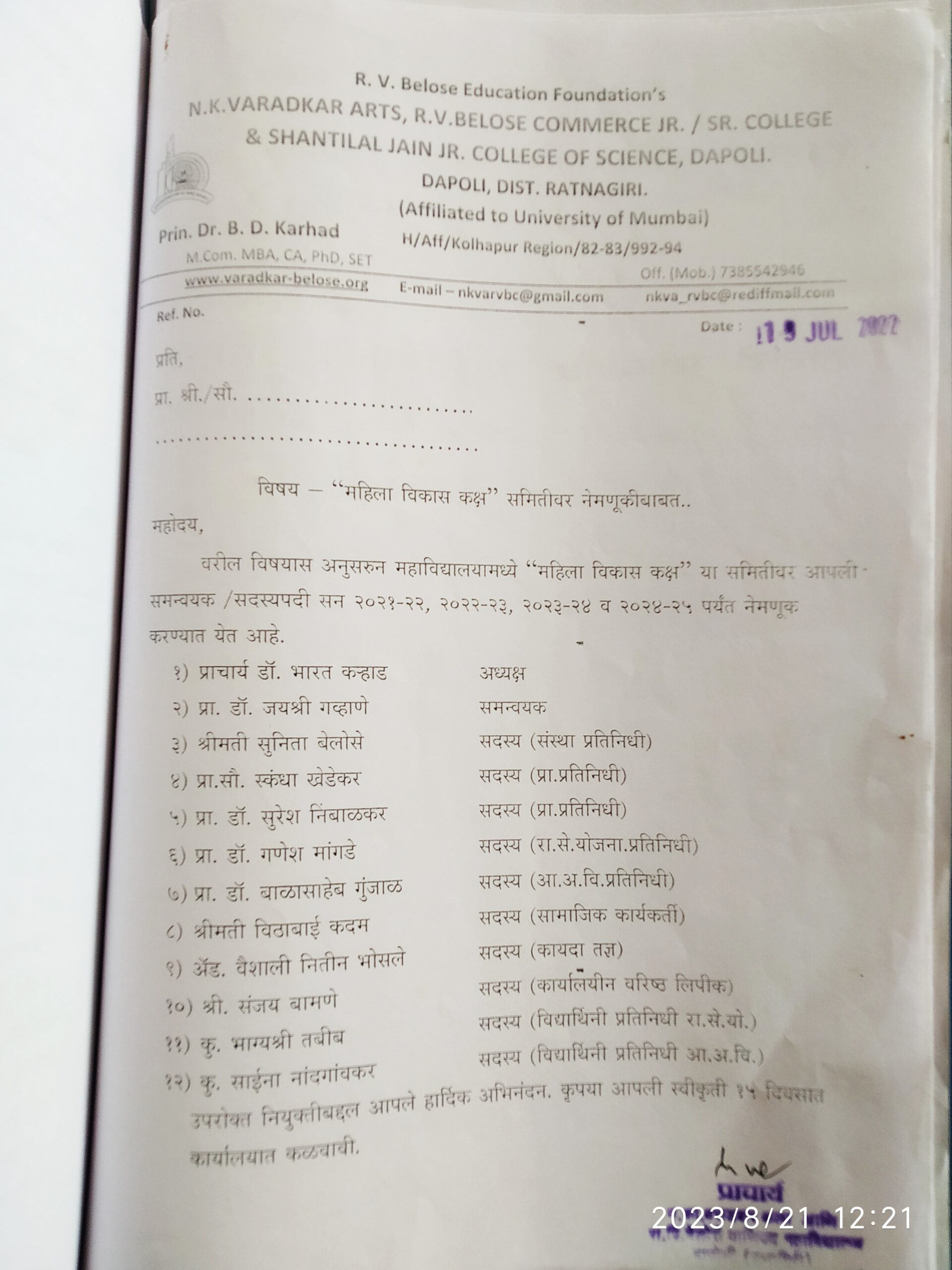
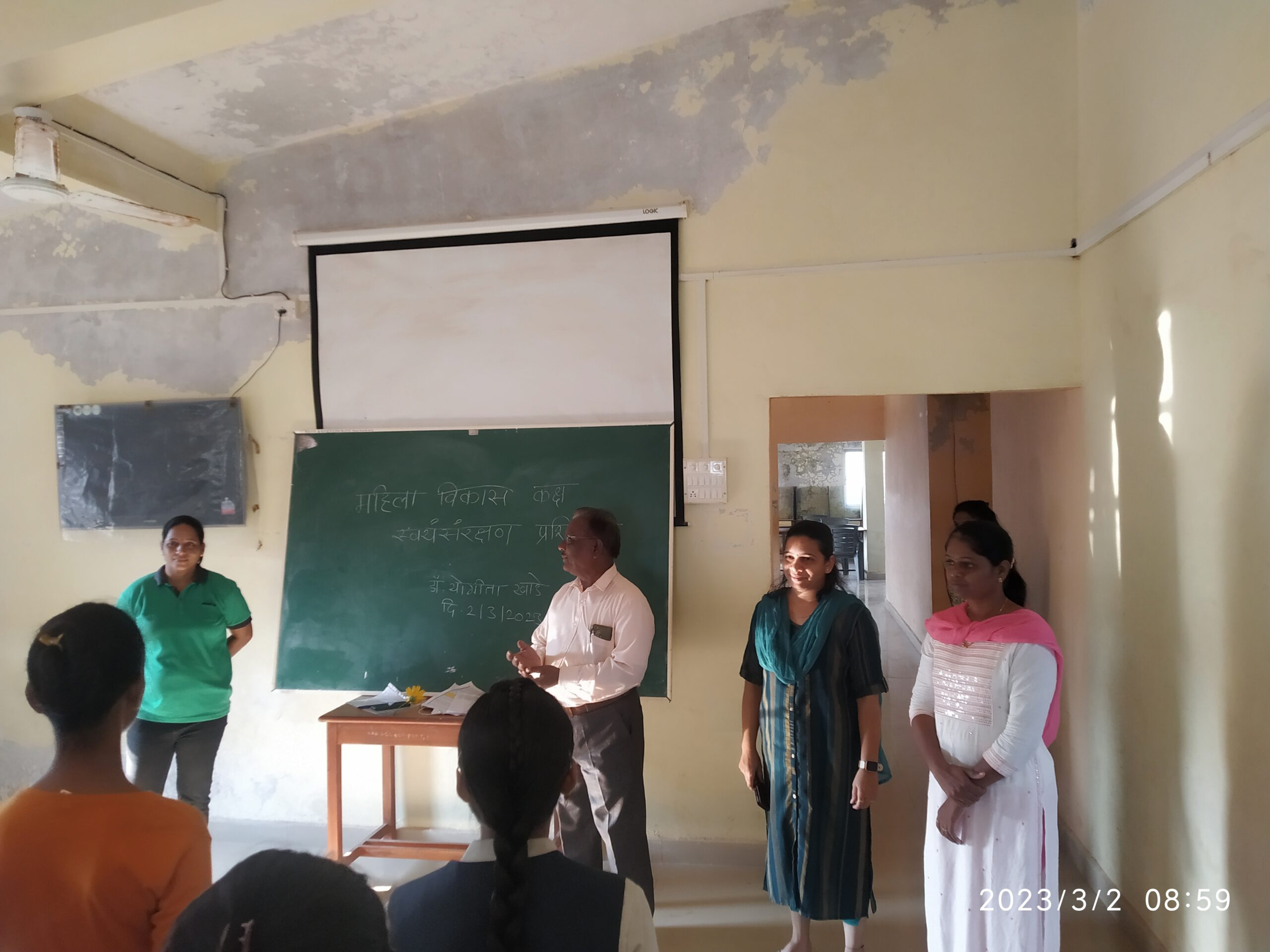
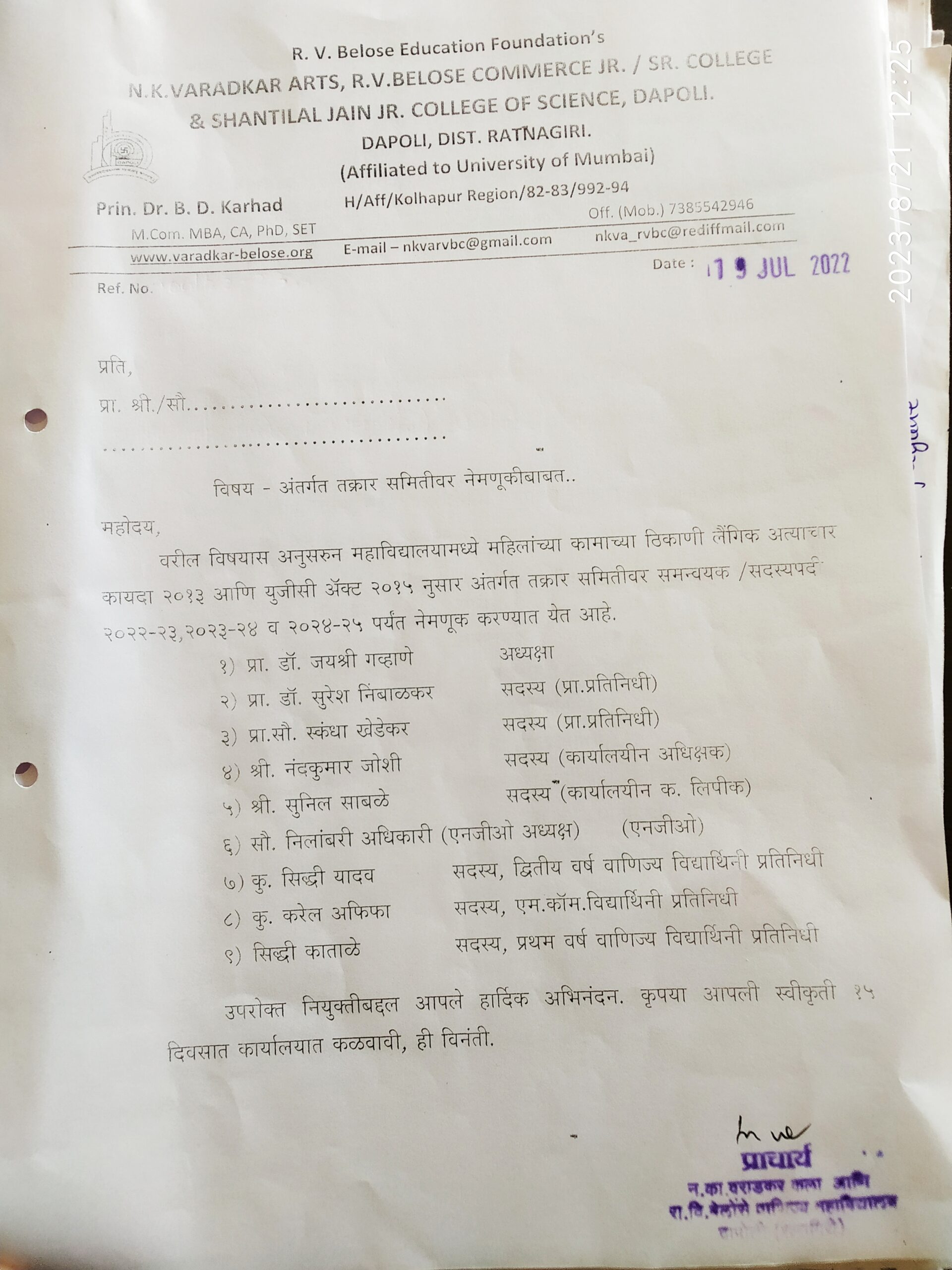
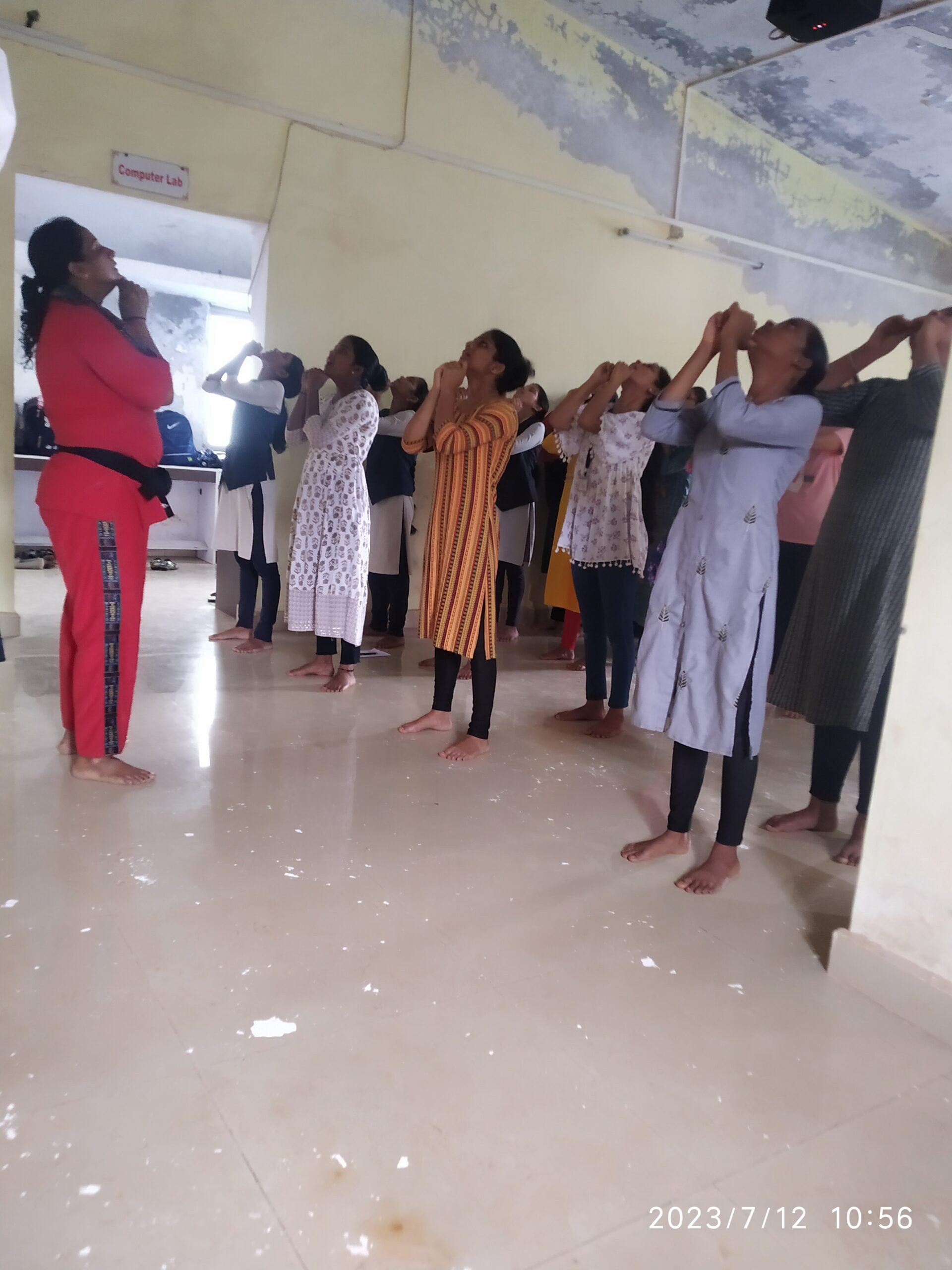
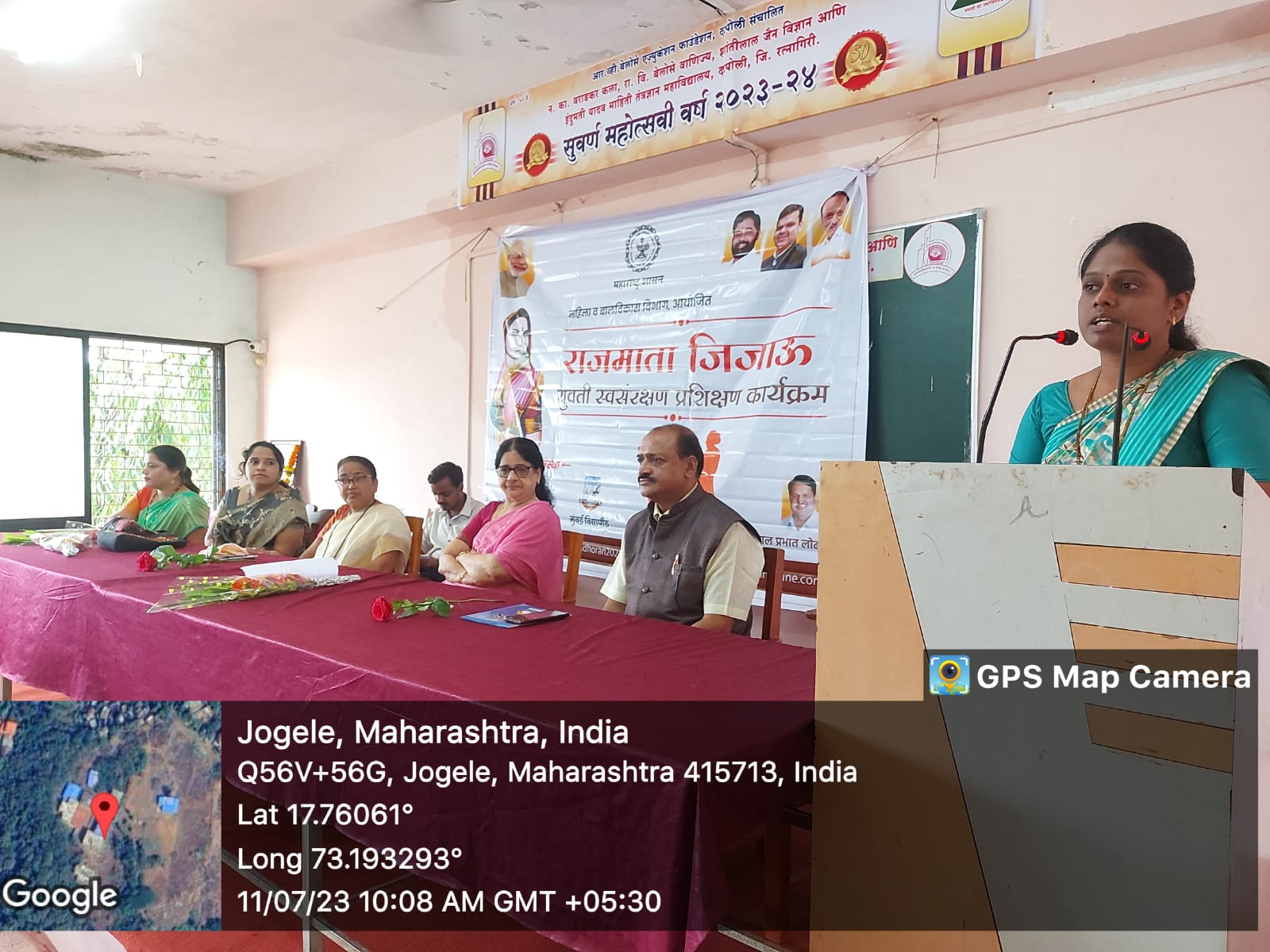
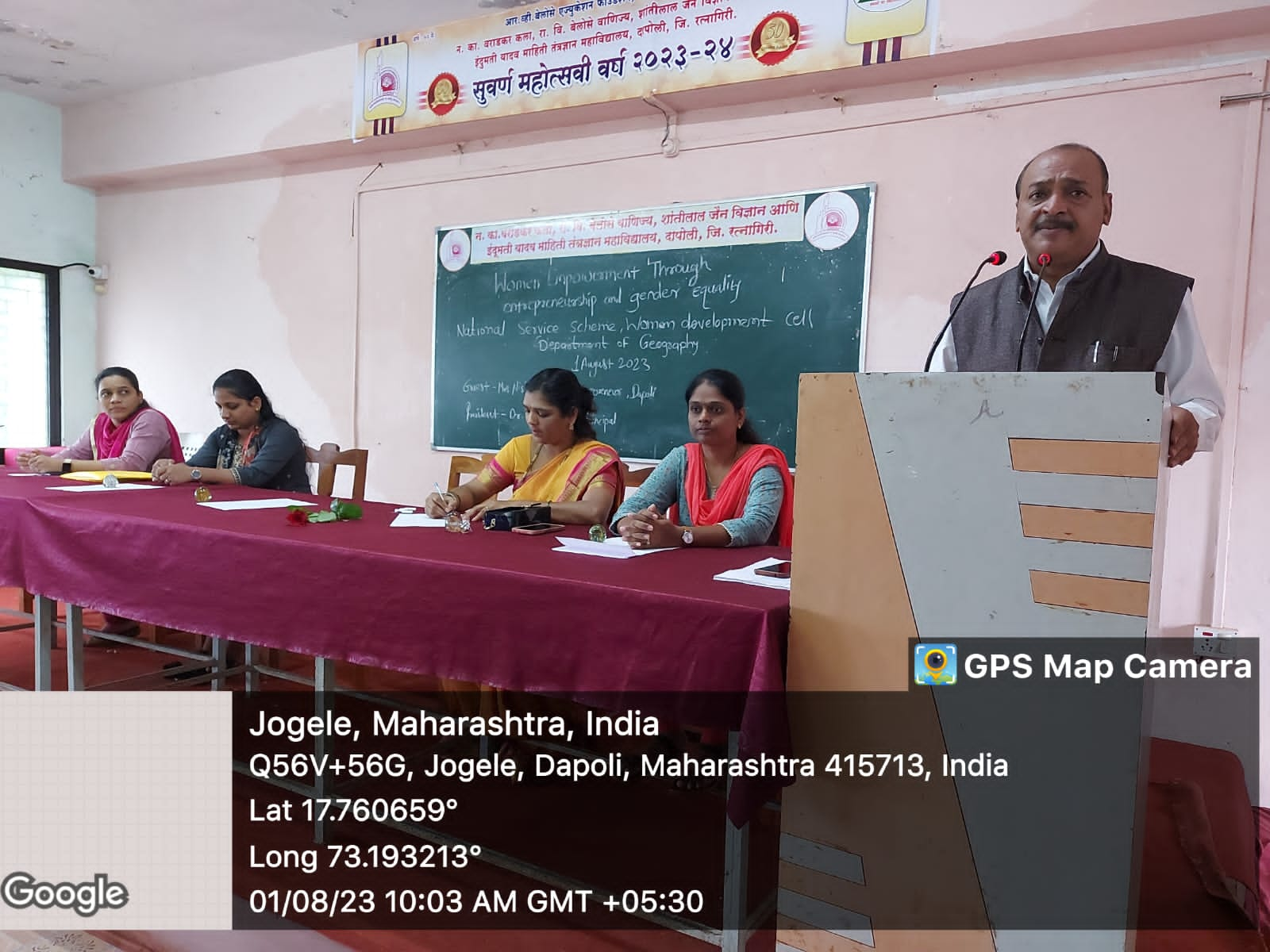
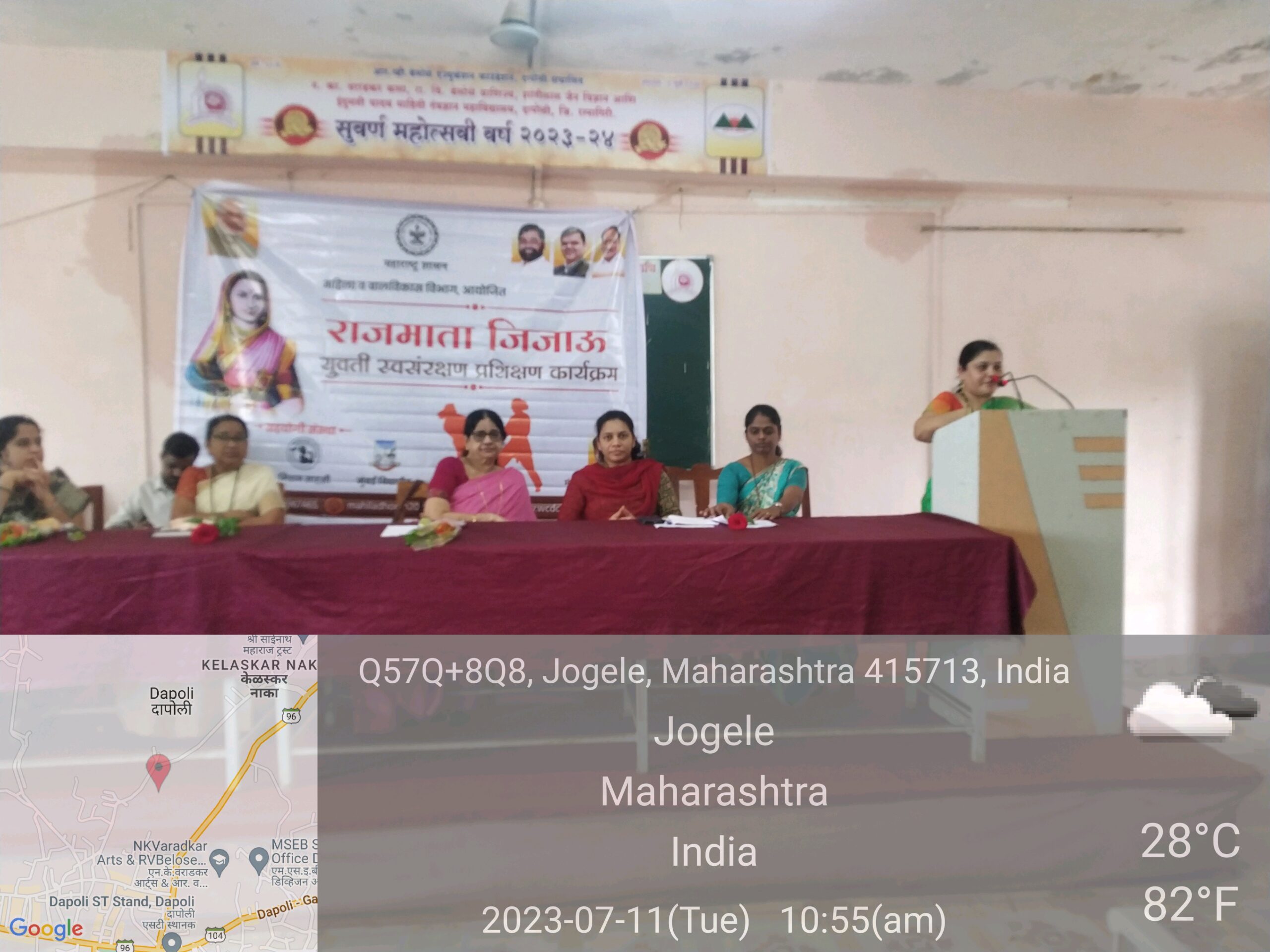

Gender Policy
N. K. Varadkar Arts and R. V. Belose College Dapoli have its Gender policy. Ours institution is the most preferred institute for girls. Girls from the city and nearby villages take admission to our college. The total number of girls in our college is maximum. Our institution works towards the overall development of students. Our institution has developed safe, secure and organized learning environment for girls. The Gender policy is integral part of all institutional policies and programmes. Gender equality and equity aims at ensuring both women and men including staff and students are considered equal and treated equally in terms of dignity and rights. It aims to empower the students. The atmosphere in the college is such that there is not any kind of discrimination particularly based on sex. The Gender policy provides guidelines and frameworks for promoting gender equality. The institute raises awareness regarding gender sensitization by organizing various events .The college has formed the Women Development cell, Grievance Redressal cell. The Gender Equity Policy in the college provides a framework of principles and practices that will improve the opportunities to all the students regardless of whether they are males or females. The Gender Equity Policy has been developed so that no students in the college campus are disadvantaged on the basis of gender. The Indian constitution provides equality before law for women under Article 14. The Article 15 prohibits discrimination on the grounds of religion, race, caste, sex, place of birth. Framing a Gender policy is a commitment towards our Indian Constitution. The overall effort is to promote gender equality within the institution and to strengthen the gender sensitivity among students and staff. The institution is taking conscious and continuous efforts to maintain a balanced and equal environment.
Mission:
The mission is to achieve gender quality in the society, to promote the social, educational, economic development of women, eliminating discrimination against women, developing policy guidelines, regulations, procedures and practices that will serve to ensure equal rights and opportunities for women & men in the institution.
Objectives
- To provide equal opportunities to both male and female students and staff members & to create conducive environment for women and men at work place.
- To create awareness amongst the students and staffs members about their social, cultural, economic, political and institutional rights.
- To empower the girls with healthcare, physical, moral, cultural and skill development of students.
- To promote Gender equality among students and staff members of the college by providing equal access and services of the institute
- To organize gender awareness programmes such as guest lectures, seminars, workshops on regular basis.
- To abolish discrimination on the basis of gender.
- To create awareness among girls about their health, nutrition and hygiene. To conduct health check-up camps frequently for girl students.
- To develop a sense self-confidence and overall personality development.
- To eliminate gender discrimination and harassment at the workplace.
Strategies:
- Recruiting adequate women staff and ensuring the balance, an objective of achieving a numerical balance in all posts at all levels as far as possible.
- Ensuring equal opportunities for male and female staff for personal growth, in promotion benefits, training and working conditions
- Ensuring equitable representation & participation of men & women in various functional committees of the institution.
- Providing a safe and secure workplace for women staff, free from sexual harassment with a Gender complaint committee or Grievance Redressal Cell to look into specific concerns.
- Providing an enabling and friendly work environment where both men and women enjoy and actively participate in work.
- Reviewing the institutional structure, functioning, problems in relation to gender imbalances among staff and the work environment time to time and taking definite steps to address the same
- Sensitizing the male students and staff and mobilizing their support towards gender balance in the campus.
- Making all career advancement systems and policies gender-sensitive and responsive, and integrating gender indicators into staff performance appraisal systems.
- Ensuring that the conceptual clarity and sensitivity on gender issues will be one of the important selection criteria in recruitment processes and capacity building efforts of staff.
- Following all statutory requirements related to maternity and paternity leaves.
- Ensuring that staff access to and use of information technology is gender equitable.
